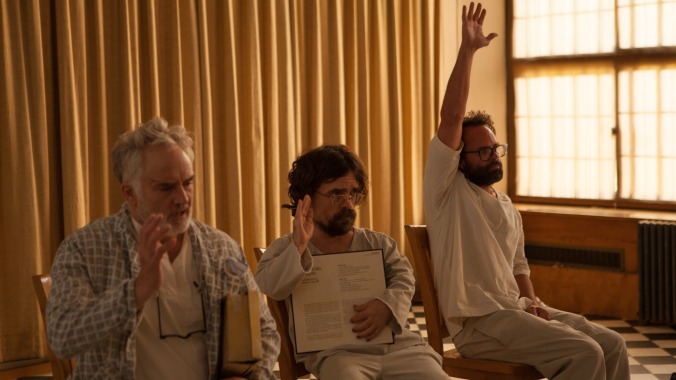Three Christs? In this economy?

The title is a groan-inducing misnomer: While there are indeed “three Christs” in Jon Avnet’s film by the same name—i.e. three paranoid schizophrenics who each believe they are Jesus Christ—a fourth walks amongst them. He’s Dr. Alan Stone (Richard Gere), a new psychologist at Ypsilanti State Hospital who treats these patients with talk therapy instead of electroshock. Avnet and co-writer Eric Nazarian characterize Stone as a hip figure in the late-’50s mental health system: He believes in empathetic care, not punitive faux-remedies. He loves Lenny Bruce. He has an active sex life with his wife and former research assistant (Julianna Margulies), who unwaveringly supports her husband at every turn. Yet Stone also suffers from Christ-like delusions about his ability to cure patients of mental illness. Three Christs is the kind of film that verbalizes this subtext by having Stone make a Freudian slip about the number of Christs in his care. You see, the schizophrenics are treating him as well.
Three Christs is based on a 1959 case study by social psychologist Milton Rokeach, who later came to believe his research was built on unethical, manipulative tactics. Rokeach would often act dishonestly towards the three Christs, giving them forged letters from the hospital chief or close relatives that would cause them further distress instead of dismantling their delusions. Avnet includes these events in Three Christs, but the film’s saccharine tone and Gere’s banal performance nevertheless belies the most compelling real-life wrinkle in the story: Stone, a character based on Rokeach, never becomes the film’s accidental villain as good intentions curdle into darker methods. Instead, he’s portrayed as a renegade doctor who thumbs his nose at administrative red tape and goes against his superiors at every turn. He doesn’t play by the rules but gets—not results, exactly, since his patients are never “cured.” Still, he rates higher than the unfeeling automatons who want to shock them into catatonic states, so who’s to say if he’s actually a negative force?
Rather than explore the myriad failures of mid-20th century America’s mental health system—the ostensible focus of Three Christs—Avnet and Nazarian indulge in trite observations about the mentally ill, while stumbling through by-the-numbers backstories of every principal character that conveniently explain their behavior. Still, Three Christs’ hackneyed script can’t explain away the tic-heavy, borderline-offensive performances by the main trio of Peter Dinklage, Bradley Whitford, and Walton Goggins, all of whom affect stereotypically “crazy” dispositions or accents that the inmates from One Flew Over the Cuckoo’s Nest would consider a bit much.
Nor does it account for the film’s slapdash editing—which makes Three Christs feel both rushed and painfully long—or Avnet’s tiresome point-and-shoot direction. Similar to the corny writing, Jeff Russo’s syrupy score prods you in the ribs whenever it’s time to feel. An insipid, boring mess, Three Christs doesn’t even have the decency to be amusing, apart from Stephen Root’s forced delivery of the film’s title followed by a what-a-world head shake. There’s no salvation to be found in this story of a sane man learning about his own limitations from the insane—only suffering.